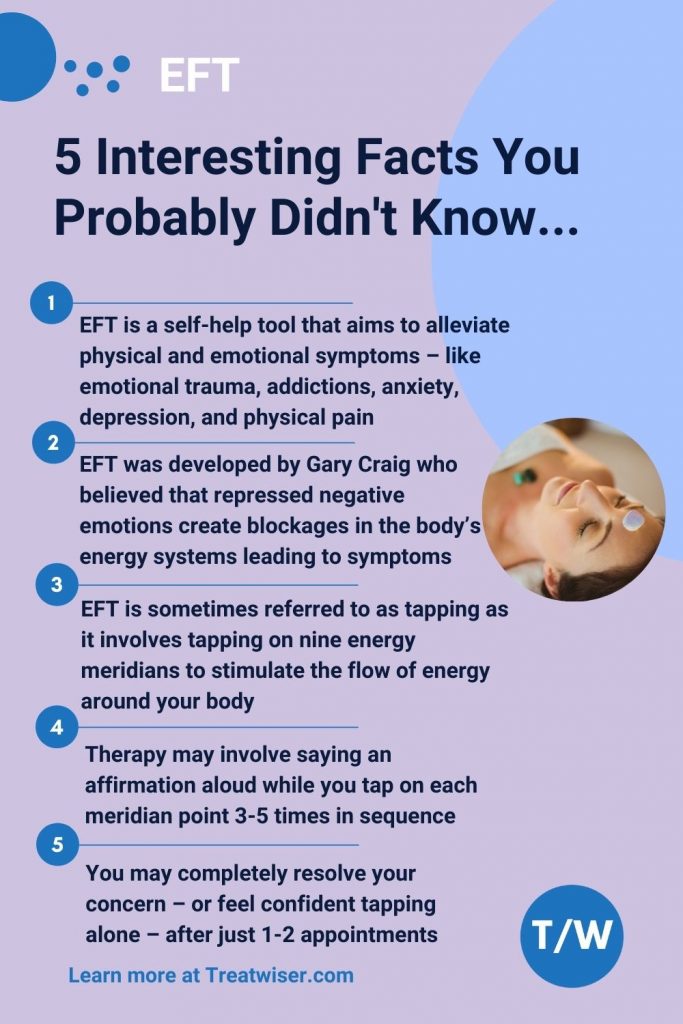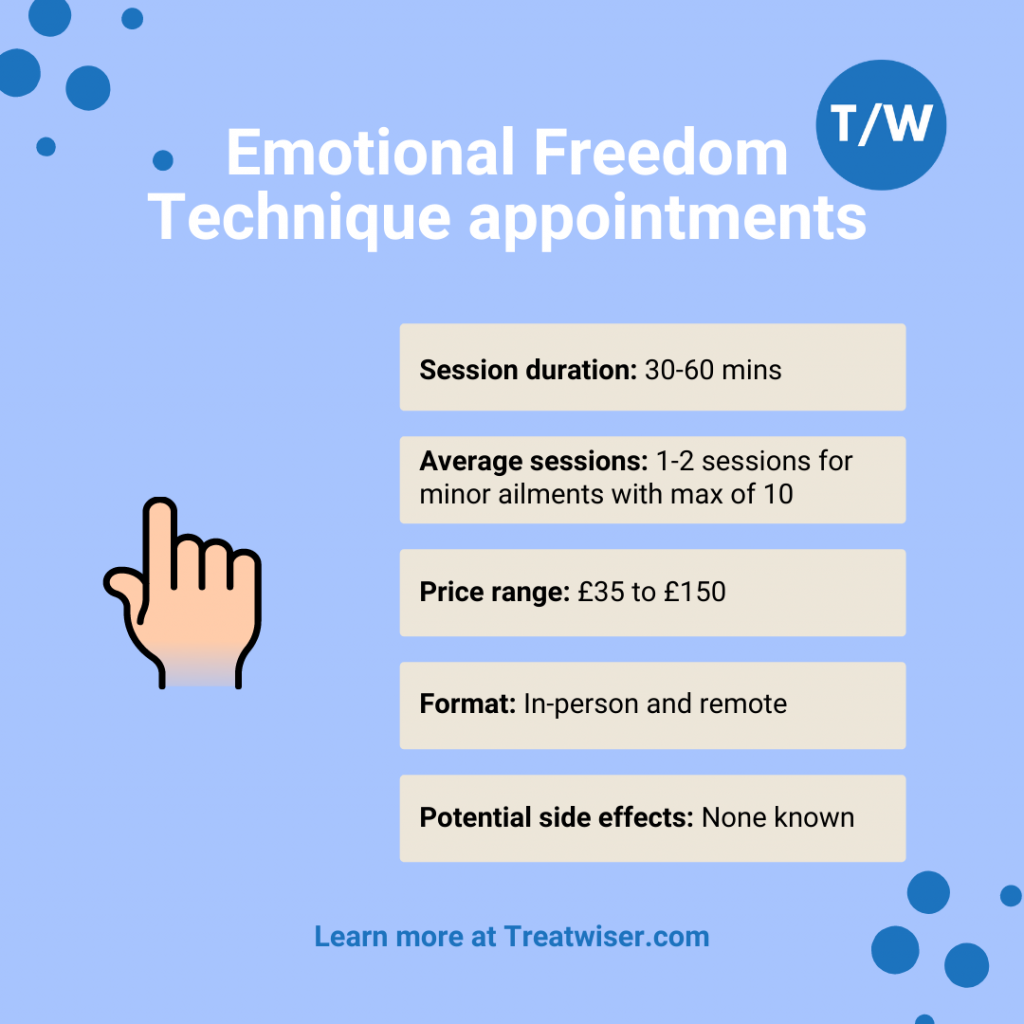Emotional stress and trauma put your nervous system into a state of “fight, flight, or freeze”, which has long-term consequences for your physical and mental health. Emotional Freedom Technique (EFT) is a self-help tool that aims to alleviate physical and emotional symptoms – like emotional trauma, addictions, anxiety, depression, and physical pain.
In this article, you’ll learn about the origins of EFT, how it works, and who can use it. We’ll also tell you what you can expect when visiting an EFT practitioner.
Table of contents
- 5 interesting facts about Emotional Freedom Technique
- What is Emotional Freedom Technique (EFT)?
- What is the theory behind EFT and how does it work?
- What is the evidence to support EFT?
- What can I expect as an EFT patient?
5 interesting facts about Emotional Freedom Technique

What is Emotional Freedom Technique?
The Emotional Freedom Technique (EFT) is a holistic healing modality that combines energy psychology, Neuro-Linguistic Programming (NLP), and Chinese acupressure massage. It helps balance your nervous system and restore your well-being by reducing fear, anxiety, stress, and pain.
Some people refer to EFT as “tapping” or even “EFT tapping therapy” because it involves manually tapping on nine energy meridians to stimulate the flow of energy around your body.
The beauty of EFT is that it’s easy to learn, and you can practise it by yourself. However, it’s recommended you visit an EFT practitioner for guidance – especially if you have significant trauma.
What is the theory behind Emotional Freedom Technique and how does it work?
The developer of EFT, Gary Craig, believed that repressed negative emotions create blockages in the body’s energy system, resulting in physical and mental symptoms. Gary created a meridian tapping sequence to send calming signals to the nervous system and shift it into a healing state.
Practitioners believe EFT bypasses the conscious mind to resolve trauma and self-limiting beliefs, which conventional psychotherapy can’t do.
When and how is EFT applied?
EFT is suitable for people of all ages and is safe to use alongside other holistic and conventional treatments.
You begin by choosing a setup affirmation that encompasses the problem while also encouraging self-acceptance. For example, yours may be: “Even though I have a horrible migraine, I deeply and completely accept myself anyway.” You say the affirmation aloud while you tap on a meridian point located on the side of your hand – known as the karate chop point. You’ll do this three times while focusing on how you feel.
After this, you tap through the other meridian points as you say a reminder phrase. Using the above example, the reminder may be “I have this horrible migraine” or “I’m in so much pain from this migraine.”
In addition to the karate chop point, these are the other eight meridian points:
- Beginning of the eyebrow
- Side of the eye, on the bony area
- Under the eye
- Under the nose, between the nose and upper lip
- Under the chin
- Beginning of the collarbone
- Under the arm
- Top of the head, directly in the centre
Tap 3-5 times on each point with two fingers while saying the reminder phrase. When the meridian points are on both sides of the body, you can tap on both or just one.
EFT is used in a range of situations
EFT proponents have found it can ease various emotional and physical symptoms. Interestingly, practitioners often say “try it on everything” because it’s non-invasive and risk-free.
People commonly seek out EFT for the following reasons, however more research is required to support its efficacy, and you should always speak to your GP or qualified medical practitioner before booking any appointments:
- Physical pain
- Anxiety and low mood
- Stress
- Panic attacks
- Low self-esteem
- Anger
- Phobias
- Bad habits
- Overeating
- Food cravings
- Weight loss
- Allergies
- Burn out
- Sleep problems
- Fatigue
However, EFT is not used to diagnose or cure any health problems.
What is the evidence to support Emotional Freedom Technique?
There have been several studies to support using EFT for anxiety, depression1, post-traumatic stress disorder (PTSD)2, and improving eating habits3.
A 2019 study found that people who attended a 4-day EFT workshop experienced reduced levels of anxiety, depression, PTSD, and pain4. EFT also improved blood pressure and feelings of happiness. This supports the assertion that EFT activates your parasympathetic nervous system.
What can I expect when visiting an Emotional Freedom Technique practitioner?
EFT is self-directed, but you can seek guidance from a EFT therapist to learn the EFT tapping techniques and find what affirmations work for you. Appointments typically last 30-60 minutes. Once you feel more comfortable, the goal is to perform tapping on your own whenever you need it.
The EFT appointment
The first EFT appointment lasts about 90 minutes. The EFT therapist will discuss your current issues and health goals to get an idea of what to focus on in the session. They’ll also explain the process, demonstrate the EFT tapping points, and help you develop your setup affirmation.
Before you begin, your practitioner will ask you to rate the intensity of the symptom or emotion you’re working on from 1-10. For example, your anxiety might be 7 on the severity scale.
The practitioner will guide you as you perform short, firm taps on the meridian points. The affirmation is said aloud, and you’re encouraged to think about the unpleasant symptoms, experiences, or memories while tapping on your energy meridians. During the session, it’s normal for your affirmation to evolve as different emotions come up.
After each round of tapping, you’ll rate the intensity of the emotions or symptoms again, repeating rounds until the intensity drops. The aim is to accept and release the negative emotions and symptoms.
At the end of the session, you’ll be encouraged to drink water and rest regularly as your mind and body integrate the therapy.

How do I find an EFT practitioner and what qualifications should they have?
EFT isn’t regulated in the UK, and practitioners don’t need a specific qualification to practise. It’s essential to do your research and ensure your practitioner has experience. This therapy can bring up intense emotions, so working with a trained practitioner is vital.
In our Treatwiser directory, you can find an EFT therapist near me and check their qualifications and area of interest. If you can’t find a practitioner in your area, many also offer online sessions.
How much will it cost?
EFT is not available on the NHS. A private session may cost between £35 and £150, depending on the length of the session and the practitioner’s experience.
How many appointments will I need?
You may completely resolve your concern – or feel confident body tapping alone – after just 1-2 appointments. For example, research shows as little as one session may resolve a phobia, while 4-10 sessions may be necessary for people with PTSD5.
How will I feel during Emotional Freedom Technique sessions?
EFT should never be physically draining or painful. However, it’s normal to cry or yawn – this signifies a release.
What are the major risks associated with EFT treatments?
EFT is a safe technique that comes with no side effects. We suggest working with a trained practitioner if you have experienced severe trauma, as EFT may trigger an emotional reaction.
Resources and further EFT information
- https://pubmed.ncbi.nlm.nih.gov/27843054/
- https://pubmed.ncbi.nlm.nih.gov/27889444/
- https://pubmed.ncbi.nlm.nih.gov/26797227/
- https://www.ncbi.nlm.nih.gov/labs/pmc/articles/PMC6381429/
- https://pubmed.ncbi.nlm.nih.gov/28874920/
DISCLAIMER: The Site cannot and does not contain medical / health advice. The medical / health information is provided for general informational and educational purposes only and is not a substitute for professional advice. Accordingly, before seeking any form of medical advice, diagnoses or treatment based upon such information, we encourage you to consult with your GP or other qualified health practitioner. You must never disregard professional medical advice or delay in seeking it because of something mentioned on this Site. The use or reliance of any information contained on the Site is solely at your own risk.





